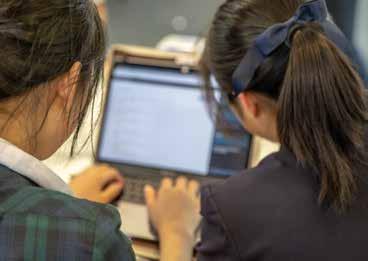
4 minute read
From the Editors
Research from the Foundation for Young Australians (2018) indicates that young people today are likely to have 17 jobs over five different careers in their lifetimes. How is Pymble preparing our students with the knowledge and skills they will need to thrive in a constantly changing environment outside of school? As educators of the next generation of leaders, some of our responses are explored in this edition of Illuminate. This edition shares ways our Pymble teachers are expanding their professional outlook through research, especially into areas relevant to the challenge of educating for the future. For some time there has been a widespread concern among both academics and teachers about student engagement in school and in learning (Fredericks et al., 2004; Zyngier, 2004). There is a need for an approach to pedagogy that allows students and teachers to focus on improving the process of learning, enabling them to reflect on their approach, developing selfawareness about the reason for study, the learning process itself, and how education is of benefit.
When we look at education, we often look at it in terms of student outcomes, growth and learning. Education should enable all students to understand, or at least, to make sense of the world around them and the qualities within themselves so that they can participate as active, compassionate contributors to society. We need to shift from a knowledge-only based education towards incorporating skills such as creativity, critical and creative thinking, communication and collaboration. It is essential for students to acquire a deeper knowledge and versatility around these key skills. Students need to be able reflect and adapt; learning how to learn through metacognition and a growth mindset. At Pymble Ladies’ College we continue to innovate in both the theory and practice of teaching and learning to ensure quality opportunities that prepare our students for life and work in a globally connected society. This second edition of Illuminate takes readers on a global journey, exploring opportunities beyond our gates and contributing meaningfully to research, the wellbeing of students, professional learning as central to practice, and students’ holistic progress. It is here our teachers challenge conventions in the learning environment to reveal themselves as innovators and designers. Education is not a linear algorithm but a human endeavour. Education of the future needs to reflect the intricacies of this human endeavour known as teaching, giving attention to the people operating within the system, valuing teacher and student voices on learning and instruction, building social capital and culture, using technology as an accelerator of learning, and emphasising the strength of collective learning. This edition presents articles on a range of topics. The University of Cambridge and the
University of Oxford program saw students immersed in the global academic community where minds were opened to global educational practices, enhancing future passions. The Junior School Robotics STEM program reflects the resilience of our students to cope with uncertainty and the importance of 21st century skills. Additionally, the NSW Association of Independent Schools Research to Practice Project in the Preparatory School has afforded teachers the opportunity to “use highimpact techniques in classroom practice and be on the front foot with the new NSW Syllabus for the Australian curriculum: Science and Technology K-6”. The Enhancing Professional Practice report emphasises the positive impact that designing and conducting research has on student learning and teacher purpose. This edition also contains a critical book review focusing on the measuring and ranking of school performance and the effects this has had on the Global Reform Movement.
At Pymble Ladies’ College we continue to innovate in both the theory and practice of teaching and learning to ensure quality opportunities that prepare our students for life and work in a globally connected society.”
We commend to you the article on our Indigenous Scholars Program which shares the College’s strategy around improving outcomes in Aboriginal and Torres Strait Islander literacy and numeracy. Through collaboration with the NSW Association of Independent Schools, the report which underpinned this article was compiled with a plethora of Pymble data. The report and article provide an insightful look into what works in this vital educational area and the very firm platform upon which we stand to continue making a positive difference. In the 21st century, what you know is not sufficient; it is also how you use and apply what you know to engage and adapt to a rapidly changing world. This edition reflects our teachers’ and students’ abilities to adjust to the dynamics of the Information Age, coupled with the need for multi-tasking, versatility and speed, to form an essential component of the new learning paradigm. It mirrors the ability to continue to learn in deliberate and comprehensive ways, awakening the passions within. As Plutarch states, “The mind is not a vessel that needs filling, but wood that needs lighting”.

DR SARAH LOCH DIRECTOR OF RESEARCH AND DEVELOPMENT MS TRICIA ALLEN DIRECTOR OF TEACHING AND LEARNING
References Foundation for Young Australians. (2018). The New Work Reality. Retrieved from https://www.fya.org.au/wp-content/uploads/2018/06/ FYA_TheNewWorkReality_sml.pdf Fredericks, J. A., Blumenfeld, P. C. and Paris, A. H. (2004). School Engagement: Potential of the Concept, State of the Evidence, Review of Educational Research, 74(1), p 59-109. Zyngier, D. (2004). Engaging pedagogies and pedagogues—What does student engagement look like in action? Proceedings of the AARE 2004 International Education Research Conference: Doing the Public Good: Positioning Education Research, Melbourne, Australia.










